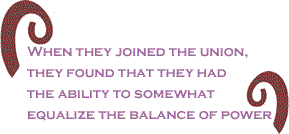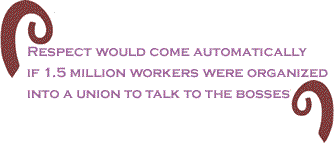When,
on Monday, the U.S. Supreme Court ruled unanimously against
the right of more than one million of its women workers
to sue Walmart for bias and discrimination in pay and promotions,
Corporate America rose to its feet and sang a song of victory.
 The
lawsuit had been years in the making against the world�s
largest retail chain and the largest private employer, but
the court decided that the women did not have enough in
common to be considered a class for the purposes of a lawsuit. The
lawsuit had been years in the making against the world�s
largest retail chain and the largest private employer, but
the court decided that the women did not have enough in
common to be considered a class for the purposes of a lawsuit.
The
court did not make a decision on the merits of the class
action suit, but they clearly decided that the members of
the class, working in 3,400 retail stores in every state
and in various positions, management and line worker, did
not have enough in common to satisfy the legal definition
of a class under federal law.
Some
of the women can, and some said they would, continue to
try to prove that Walmart discriminated against them. The
giant firm maintained that it gave much of its authority
for pay and promotion to the supervisors and managers in
each of its thousands of stores, and therefore, there could
not have been a blanket policy of discrimination. Justice
Antonin Scalia decreed it to be so and the other eight justices
agreed.
Although
the ruling was unanimous in that aspect, at least one justice
said she would have allowed the class to pursue their case
under another section of the federal rules governing class
action lawsuits. But, said Justice Ruth Bader Ginsburg,
the court ruled that out by tossing the class action on
the basis of failure to prove that all of the women had
issues in common. The overall (unanimous) ruling precluded
the women from continuing their lawsuit. Some of them indicated
that they would pursue similar or ongoing cases on the store
level or regional level, which will be much harder to sustain
because of the high cost of litigation and the geographical
breadth of the company�s properties.
Walmart
knows that, as does the U.S. Supreme Court and the rest
of Corporate America. Many large companies celebrated the
victory over the women, especially since the decision is
very likely to have the effect of discouraging future similar
lawsuits and protect them from the bother of their workers
seeking justice in the workplace. No one knows how long
it will take before another lawsuit of this magnitude will
be put together and eventually reach the high court.
 One
thing this decision shows is that Corporate America is inexorably
tightening its control on the economy of the U.S.
Its decades-long attack on unions has been an attack on
the rights of American workers to even form unions. They
hate unions because they tend to counterbalance the power
of the combination of big business and the various legislatures,
starting with the U.S. Congress. We have witnessed the recent
coordinated attacks by Republican governors against their
own workers, but those attacks also have a highly detrimental
effect on all workers, whether in the public or private
sector. One
thing this decision shows is that Corporate America is inexorably
tightening its control on the economy of the U.S.
Its decades-long attack on unions has been an attack on
the rights of American workers to even form unions. They
hate unions because they tend to counterbalance the power
of the combination of big business and the various legislatures,
starting with the U.S. Congress. We have witnessed the recent
coordinated attacks by Republican governors against their
own workers, but those attacks also have a highly detrimental
effect on all workers, whether in the public or private
sector.
Most
of Walmart�s workers reportedly are women and a sizable
percentage of those women are black or other minority workers
and the policies of the company, regardless of the source
of the animus toward women, have harmed their ability to
provide for their families. That is true whether they are
line workers, supervisors, or managers. Now, for most of
them, it�s back to the beginning.
Throughout
America�s labor history,
the militant unions continually reminded workers not to
depend too much on presidents, senators, representatives,
or their state or local governments to provide a measure
of equity and equality in the workplace. They declared that
the only way to achieve justice is to demand it. That same
history is filled with examples of the struggles of workers,
who were mistreated, exploited, underpaid, and made to die
while working in unsafe and unhealthy conditions. When they
joined the union, however, they found that they had the
ability to somewhat equalize the balance of power.
Pay
scales were standardized. Seniority replaced the favoritism
and nepotism that are rampant in a non-union environment.
For a time, workplaces became safer and healthier for all
workers.  It
was unions that pushed passage of the Occupational Safety
and Health Act (OSHA), after all. Healthier workplaces also
improved the quality of the environment outside the plant,
as well. It
was unions that pushed passage of the Occupational Safety
and Health Act (OSHA), after all. Healthier workplaces also
improved the quality of the environment outside the plant,
as well.
Just
last week (as if in anticipation of this week�s Walmart
decision), about one hundred Walmart workers from across
the country, representing the company�s workers from around
the U.S.,
visited company headquarters in Bentonville,
Ark. They are organized in a group
called Organization United for Respect at Walmart (OUR Walmart).
They went there with one request: that the company respect
them (keep in mind that the company calls its workers �associates,�
denoting something more than �employee�).
When
OUR Walmart representatives went to Bentonville last week,
they went with a message to company officials, contained
in the new group�s �Declaration of Respect,� which is literally
a list of grievances that the �associates� have with Walmart
managers across the country. Basically, they said in their
declaration: �The fundamental desire to be shown respect
is what led us to join together as OUR Walmart, an organization
of Walmart Associates, by Walmart Associates, for Walmart
Associates. We are one Organization United for Respect at
Walmart.�
They
want the company to live up to the principles they say were
established by Sam Walton, the late founder of the company,
including free speech, the �open door� policy of management,
freedom from bias and discrimination, and Sam Walton�s purported
attitude of �respect for the individual.� When the group�s
representatives stood in front of corporate headquarters
in Bentonville, eventually a company spokeswoman came out
to talk with them. They thought this was progress, but the
company apparently made no promises on any of the issues,
and then they went home.

Every
one of the issues they cited in their Declaration of Respect
and the problems that were addressed in the class action
lawsuit (or would have been addressed, if the case had actually
been heard by the Supreme Court) would be negotiated at
the bargaining table, if the Walmart workers organized a
union. It�s what unions do and the best of it is that the
workers, including the �associates� who went to Bentonville,
would be the leaders of their own union. They already have
shown leadership by organizing and speaking out.
Be
sure, however, that respect would come automatically if
1.5 million workers were organized into a union to talk
to the bosses. The workers would not have to go to Arkansas to ask if the company would please show
workers some respect. As a united front at the bargaining
table or in the grievance procedure, they would face the
company on equal footing and respect would come from that.
No pleading. Just respect.
Surely,
it will be a long process to form a Walmart union, but that�s
what trumps all of the politicking, lobbying, and pleading:
a union contract, as described in the laws of the land.
Whether
the U.S. Supreme Court or Walmart bosses or Corporate America
want to admit it or not, OUR Walmart said it all in describing
the formation of their group and their visit to headquarters
last week:  �For
many of us, this was the first time we had met other Associates
who experienced similar problems from stores in other states.
But when we spoke with each other for the first time, it
became clear that we shared common concerns.� �For
many of us, this was the first time we had met other Associates
who experienced similar problems from stores in other states.
But when we spoke with each other for the first time, it
became clear that we shared common concerns.�
Without
knowing the result of the class action suit, the �associates�
found that conditions were pretty much the same from store
to store, all 3,400 of them. And that gave the lie to the
court�s assertion that the workers were too disparate to
have the wherewithal to bring a class action suit, never
mind the merits.
Now,
the only real advice to Walmart workers, past and present
is that of the great trade unionist, organizer, and songwriter,
Joe Hill, to his union brothers and sisters before he was
executed by the state of Utah
for a crime he didn�t commit: �Don�t waste any time in mourning�
Organize!�
BlackCommentator.com
Columnist, John Funiciello, is a labor organizer and former
union organizer. His union work started when he became a
local president of The Newspaper Guild in the early 1970s.
He was a reporter for 14 years for newspapers in New York State. In
addition to labor work, he is organizing family farmers
as they struggle to stay on the land under enormous pressure
from factory food producers and land developers. Click here
to contact Mr. Funiciello.

|

